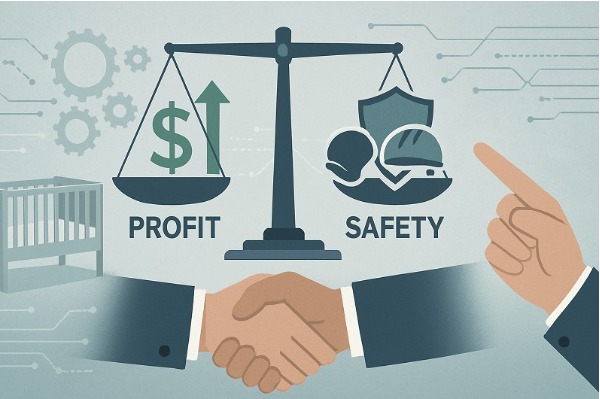Crib Procurement Trends: How B2B Buyers Can Achieve a Win-Win in Profit and Safety?

The baby crib, a core product in the maternal and infant market characterized by high value and critical safety risks, sees its supply chain choices directly determine a retailer’s or distributor’s market competitiveness and brand reputation. Entering 2025, the global crib market faces a dual challenge: on one hand, extreme consumer demands for safety standards and eco-friendly materials, and on the other, volatility in global logistics costs and raw material prices.
For B2B buyers, success is no longer simply about “finding the cheapest source”; it has shifted to “how to secure a strategic partner capable of providing stable, compliant, and design-forward products.”
In the current environment, traditional purchasing models—those based solely on price—can no longer meet the market’s intense demand for high quality, traceability, and sustainability. Retailers and brands must focus on the source, scrutinizing the manufacturer’s design capabilities, production processes, and risk control. This scrutiny is not merely about minimizing recall risks; it’s about building enduring trust and achieving a competitive differentiation in a crowded market.
Six Core Dimensions for Evaluating Crib Manufacturers
Selecting a crib manufacturer is a complex due diligence process that requires a comprehensive assessment of safety standards, production efficiency, and innovative capability. Wholesalers should use the following six dimensions as the strategic basis for choosing a supplier:
The Advantage of China Manufacturing
When seeking reliable bulk supplies of cribs, procurement teams must evaluate the supplier’s supply chain depth. As the world’s largest manufacturing hub, China offers unparalleled scale and integrated supply chain advantages. This strength is evident in the availability of raw materials, the mature network for hardware components, and high-volume, high-efficiency production capacity.
By partnering with manufacturers who possess robust supply chain management systems, B2B buyers can effectively hedge against the risks of regional material shortages and transportation bottlenecks, ensuring On-Time Delivery (OTD) of orders. Brands seeking Wholesale baby beds from China should specifically examine whether the manufacturer has raw material inventory early-warning mechanisms and multi-channel logistics collaboration capabilities to respond to sudden market shifts. This “resilience” in the supply chain is key to guaranteeing stable inventory at the retail end.
Leading the Market, Not Following
Consumer demand for cribs has evolved from basic functionality to the pursuit of design aesthetics and multi-functionality. B2B buyers should not just procure stale, standard models; they must seek out manufacturers with strong independent R&D capabilities.
- Convertibility: The market overwhelmingly favors products that can convert from a crib to a toddler bed, daybed, and even a full-size bed. The manufacturer’s design expertise must be reflected in the convenience, safety, and long-term durability of this conversion process.
- Design Trends: Can the manufacturer timely capture and execute popular trends like Scandinavian simplicity, modern minimalism, or gender-neutral palettes? Can their design team offer Rapid Prototyping services to meet different retail brands’ needs for product differentiation?
This mastery of innovative design is a crucial tool for helping retailers stand out in intense market competition.
Safety Standards and Compliance with ‘Zero Tolerance’
Any safety lapse with a crib can lead to permanent damage to a brand’s reputation and severe legal exposure. B2B buyers must adopt a “zero tolerance” attitude toward compliance.
A qualified manufacturer must not only comply with CPSC, ASTM (U.S.), or EN standards (EU), but should also proactively conduct third-party testing and certification. Particularly important points are:
- Material Traceability: Ensure all wood, glue, and finishes are certified non-toxic (Lead-Free, Phthalate-Free) and can provide environmental certification reports such as GREENGUARD Gold.
- Structural Durability: Verify that the manufacturer conducts dynamic stability testing (simulating a child shaking or kicking the crib) to ensure hardware and bed board connections do not loosen or fail over long-term use.
Procurement teams must request detailed Quality Control manuals to understand how the manufacturer guarantees safety compliance at every stage of production, from raw material inspection to final product shipment.
Refinement and Consistency in Manufacturing Processes
Consistency in large-scale production is a core requirement for B2B procurement. Buyers need to assess whether the manufacturer’s production equipment is advanced enough to guarantee the dimensional accuracy, surface finish smoothness, and structural integrity of every product batch.
The combination of automation and manual expertise is crucial: for example, using large-scale CNC equipment to ensure cutting and drilling precision, while relying on experienced technical workers for critical finishing, painting, and assembly stages. When evaluating a supplier, focus on their internal Quality Control (IQC/IPQC/OQC) procedures, especially their testing standards for the installation precision of hardware and the mattress height adjustment mechanism, which are vital for convertible and adjustable cribs. This control over refined craftsmanship is key to minimizing customer complaints at the retail level.
Communication Efficiency and Project Management Capability
In the global supply chain, efficient communication is the foundation of success. Can the manufacturer’s project management team provide transparent, real-time production status updates? Can they offer professional technical consultation during sampling, material selection, and customization requirements?
A professional manufacturer is not just a factory; it is a strategic partner. They should understand the commercial needs of B2B clients, such as handling urgent order insertions, specialized packaging requests, or customizing multilingual instruction manuals. This high level of communication and project management minimizes uncertainty throughout the procurement process.
After-Sales Support and Market Feedback Mechanism
A successful partnership does not end with delivery. B2B buyers must evaluate the manufacturer’s commitment to after-sales service. A reliable manufacturer should offer:
- Spare Parts Supply: Provide long-term, rapid supply of critical hardware and easily damaged parts so that retailers can efficiently handle customer after-sales requests.
- Market Feedback Loop: The manufacturer should value and encourage B2B clients to provide market feedback, incorporating this information into future product improvements and innovations. This continuous optimization model ensures that excellent companies among the list of crib manufacturers remain synchronized with market demands.
Conclusion: The Transition from Purchaser to Strategic Partner
Facing an increasingly complex global market and discerning consumers, the decision to procure baby cribs has escalated into a strategic supply chain choice. For distributors and brands seeking Wholesale baby beds from China to achieve long-term profitability and brand growth, the focus must shift from pure price competition to a comprehensive assessment of quality, safety, compliance, and innovation capability.
Successful B2B buyers understand that their brand reputation is inextricably linked to the manufacturer’s quality. Choosing a manufacturer that offers transparency, technical support, and continuous innovation means your product will not only safely enter the market but will also win consumer trust through superior quality and forward-thinking design. Through this strategic partnership model, B2B buyers can stably navigate future market challenges and secure a leading position in the competitive juvenile furniture sector.



